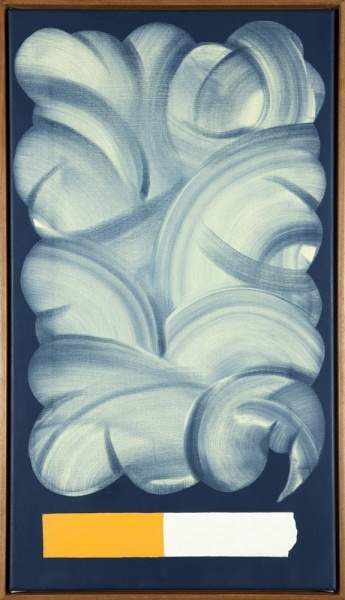Bass Principles
Cartoons and paint at Mitch Cairns' third solo show.
Overview
We have waited two whole years to see Mitch Cairns' third solo show, Bass Principles with his representative gallery, BREENSPACE. Having first joined the stable in 2008 - as a wee child of 24 - Cairns has repeatedly proven that he is no flash in the pan. And Bass Principles is no different. Cairns presents a mature and decidedly restrained outpouring consisting of a collection of paintings supplemented by six small cartoons.
Bass Principles is somewhat of an unpacking show, a going back to the start. During the time that Cairns was thinking about his upcoming show he carried out two technical courses. The first, a short course at the Tom Bass Sculpture Studio School. The second, the Alan Moir Advanced Cartoon Class. Both are instrumental in attempting to understand the work of Cairns in his bid to deconstruct the way in which artists create work. The framed cartoons in the show are obvious references to his extra-curricular study although the lines of the cartoon are also found in his paintings. In Smokey Sad Square (2012) Cairns has deconstructed the face – eyes float across a dark abyss like some early analogue Italian animation. It is absurd, but highly constructed at the same time.
I have been looking at Cairns’ paintings for five years or so now. They are often riddles to unravel. A couple of things to remember when trying to step into the world of Cairns is that he consistently investigates a small number of themes. Firstly, we are always looking at the artist looking at himself, in his studio, his cellar door of Cartoon VIII (2011). Secondly, there is always some discussion of class as in the constant references to smoking and/or drinking - the burning pub of Cartoon XIV (2011) or the collector with his pieces in Collector with ‘Bass Principles’ (2011). Thirdly, in order to come along for the ride, one must have a sense of humour – Cairns teases us with low-grade Benny Hill-esque gags in Cartoon VI (2011) or Man Impersonating a Hat Stand (2011). Most importantly of all, we must view Cairns through the prism of an artist trying to figure art out. He deconstructs painting, essentially the frame, and asks how is that we construct? What do we leave in and, ultimately, what are we leaving out?





